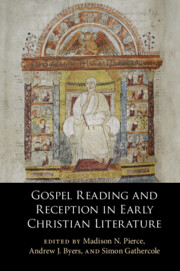Book contents
- Gospel Reading and Reception in Early Christian Literature
- Gospel Reading and Reception in Early Christian Literature
- Copyright page
- Dedication
- Contents
- Contributors
- Foreword: We Are All Gospel Readers
- Introduction
- Part I Reading the Gospel in Israel’s Scriptures
- Part II Gospel Writers as Gospel Readers
- 4 Why Not Matthew’s Use of Luke?
- 5 Luke Rewriting Matthew?
- 6 Reading Mark and Writing John
- 7 On Historical Epochê in Gospel Reading as Exemplified by John and the Egerton Papyrus
- Part III Gospel Reading as Ecclesial Tradition
- Bibliography
- Index of Ancient Sources
- Index of Modern Authors
- Index of Subjects
7 - On Historical Epochê in Gospel Reading as Exemplified by John and the Egerton Papyrus
from Part II - Gospel Writers as Gospel Readers
Published online by Cambridge University Press: 27 January 2022
- Gospel Reading and Reception in Early Christian Literature
- Gospel Reading and Reception in Early Christian Literature
- Copyright page
- Dedication
- Contents
- Contributors
- Foreword: We Are All Gospel Readers
- Introduction
- Part I Reading the Gospel in Israel’s Scriptures
- Part II Gospel Writers as Gospel Readers
- 4 Why Not Matthew’s Use of Luke?
- 5 Luke Rewriting Matthew?
- 6 Reading Mark and Writing John
- 7 On Historical Epochê in Gospel Reading as Exemplified by John and the Egerton Papyrus
- Part III Gospel Reading as Ecclesial Tradition
- Bibliography
- Index of Ancient Sources
- Index of Modern Authors
- Index of Subjects
Summary
In his Gospel Writing, Francis Watson argues that certain fragments from the so-called Egerton Papyrus that appear to have clear counterparts in the Gospel of John belong to a gospel that precedes John. This essay argues that while Watson seems right in his diagnosis of the historical sequence, he is also methodologically wrong in the manner he treats the later gospel as part of and a result of his argument. In two particular respects he mistreats John: (1) John’s use of the Egerton Gospel is no less logical than the Egerton gospel itself (though at a much more sophisticated level), and (2) John’s use of the Egerton Gospel does not allow for the discovery of “strata” within or behind John itself. In both respects, one must stick to a methodological rule that is of universal import within New Testament scholarship and directly relevant to “gospel reading”: in principle, the text that we have has priority over any attempts at reconstructing its origins.
Keywords
- Type
- Chapter
- Information
- Gospel Reading and Reception in Early Christian Literature , pp. 141 - 164Publisher: Cambridge University PressPrint publication year: 2022

